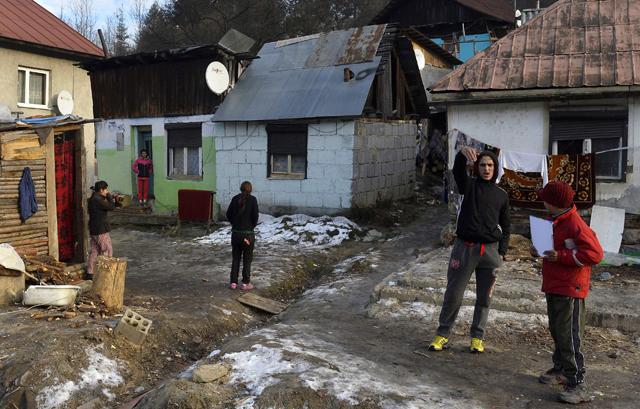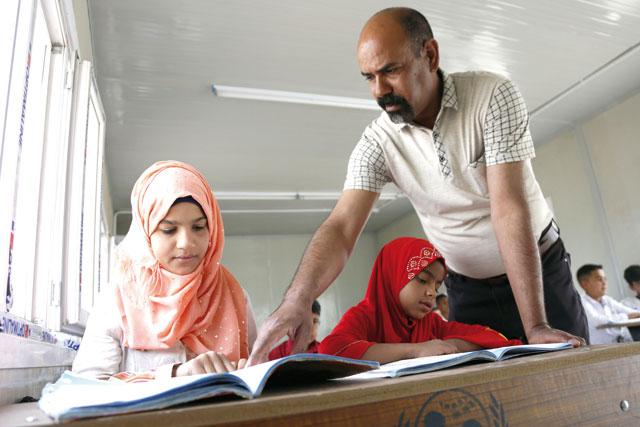CIERNY BALOG, Slovakia — The people of this peaceful village at the foot of the Slovak mountains vented their anger by electing as their regional governor a man who calls his Roma compatriots “parasites” and admires a wartime figure who collaborated with the Nazis.
Marian Kotleba’s landslide victory in November exposed pent-up frustration over unemployment and neglect by mainstream parties, together with a deep-seated animosity towards the Roma, factors that have built support for extremist politicians in Slovakia and elsewhere in central Europe.
Still, many were shocked when Kotleba — a former high school teacher who looks back fondly on the Slovak state that was allied with the Nazis during World War Two — came from nowhere to win 77 per cent of the vote in Balog, 260 km northeast of Bratislava, the capital.
Overall, in the central Slovak region of Banska Bystrica, he won 55 per cent, enough to become regional governor and a further sign that some European voters frustrated with the economic crisis were willing to take chances with extremists.
Nationalist sentiment is increasingly directed against Slovakia’s Roma, a minority of 400,000 in the country of 5.4 million who live on the fringes of society, suffering from poverty, poor education and limited job prospects. In some settlements they have no access to running water.
With European Union expansion opening borders, deprived regions have seen waves of departures, including some of Europe’s 10 million Roma, to countries such as Canada and Britain, where immigration has again become a hot issue.
British Prime Minister David Cameron has imposed new regulations on migrants amid fears of an influx of poor people from Romania and Bulgaria, for whom restrictions on free movement within the EU expired at the end of December.
Kotleba, who did not respond to requests to be interviewed for this article, ran on a platform that derided “Gypsy parasites”. Some Roma, whose forebears arrived in central Europe from India in the Middle Ages, see Gypsy as a derogatory term.
Kotleba once ran a party that was disbanded for racial hatred. The 36-year-old has organised marches in military-style uniforms and praised Jozef Tiso, the wartime leader of Nazi-allied Slovakia.
His party’s newsletters talk about “desperate villages and towns suffering from crime and terror from Gypsy extremists”.
“We voted for him out of desperation,” said Martina Strorcova, a pub owner in Cierny Balog.
She says local people on low incomes often accuse Roma of drawing welfare benefits while not being willing to work.
“It is bad to see how some of us toil and others take social support,” Strorcova said.
The pub in the village centre only has two customers at lunchtime, and Strorcova says business is tough. People who work at the local iron works bring home just 430 euros ($590) a month.
The Slovak minimum wage is 337 euros a month, less than 2 euros an hour, against the equivalent of 7.50 euros in Britain.
Cierny Balog’s 5,000 inhabitants include about 700 out of work during the winter, said social worker Lubomira Pancikova.
“The problem is unemployment, not only among the Roma but overall. Young people run away, men and women in their most productive years,” Pancikova said.
The official jobless rate in the region is 18.1 per cent, although in some areas it tops 30 per cent. It is the second worst in the country and far above the national average of 13.7 per cent.
Kotleba promises to create jobs through public works schemes, setting up public companies and farms.
“He wants to give normal people, and the Roma, a pick-axe in their hands and make them work,” said Ivana Galusova, who voted for Kotleba.
In fact, Kotleba may not be able to do much. He will be isolated in a regional assembly dominated by Smer, the leftist party of Prime Minister Robert Fico.
Tension around
eastern europe
In some places, tension has been high between the Roma and the rest of the population.
The European Commissioner for education, Androulla Vassiliou, called on authorities in Kosice in August to tear down a wall separating a Roma neighbourhood from the rest of the eastern Slovak city — a means of segregation used by local authorities in several places in eastern Europe.
In Hungary, a court jailed four neo-Nazis for killing members of Roma families in a spree of racist violence in 2008 and 2009. The gang killed six Roma in carefully planned attacks.
Around the region, anti-Roma sentiment has helped the far-right to win votes. In Hungary, the Jobbik Party has vilified the Roma, in addition to employing anti-Semitic language.
In Romania, mayor Catalin Chereches of the northern town of Baia Mare scored more than 86 per cent in local elections in 2012 after relocating Roma families — and building a concrete wall around their neighbourhood.
Some members of Bulgaria’s nationalist Attack Party, which has seats in parliament, wear swastikas on their shirts and make Nazi salutes at rallies.
Czech riot police had to intervene repeatedly this year to halt marches by hundreds of people on Roma neighbourhoods, in places where communities have swollen due to a government housing subsidy programme.
In Balog, where several hundred Roma live in impoverished settlements around the village, there are no open clashes.
But Jozef Bartos, a 20-year-old Roma, fears Kotleba’s victory might lead to trouble.
“We do not have problems here... but we have to be ready to protect ourselves, be prepared if someone comes at us,” said Bartos, who shares a two-room shack with no running water or sewerage with his wife, 18-month-old baby and parents.
He said he can make 17 euros a day, but only finds work a few days a month.
Uneven success
Slovakia is a post-communist success story, having joined the euro in 2009 and going through the global economic crisis almost unscathed. Gross domestic product per head is at 76 per cent of the EU average, up from 54 per cent a decade ago.
But economic development, based mainly on car exports, has been uneven. Mountain ranges separate the richer west, connected to Austria and the Czech Republic, from the poorer centre and east, traditionally home to most Slovak Roma.
“Companies focused on heavy industry and arms manufacture there collapsed and there has been no substitution,” said sociologist Lubomir Faltan of the Slovak Academy of Sciences.
Successive governments on right and left have done little to address social and ethnic problems, he said, and the economic crisis has made things worse.
“The Roma community has a double disadvantage. They do not have any qualifications, they can be used only for manual work, if they are willing to work,” he said. “There are villages where unemployment is 80 per cent, and Roma populations with almost 100 per cent unemployment.”
Communities with high unemployment, Roma or majority Slovak, are prone to crime — mostly petty theft, Faltan said. The long-term unemployed often become resigned and settle for handouts and casual work.
The government has been running inclusion programmes, some with the help of EU money.
“This is a warning sign. People and politicians in this country must realise that it is no longer possible to hide away from the Roma problem,” Pete r Pollak, the Slovak government representative for the Roma community, told local media.
The government is responding to public resentment over welfare abuse with legislation that will deduct any court fines from handouts and also link the payments to participation in public works programmes.
A plan drafted last year also calls for tying welfare payments to children’s school attendance, and for expanding pre-school education.
Prime Minister Fico, whose incumbent candidate Vladimir Manka lost the election to Kotleba, however blamed the media and the centre-right parties for Kotleba’s victory.
“I do not feel responsibility for the result,” he told a news conference. “For you, anything that is against Smer is good.”
The European Roma Rights Centre (ERRC), a Hungarian-based non-governmental advocacy group, said the Roma in Slovakia are discriminated against in all aspects of life.
“They are likely to be forcibly evicted from their homes, face segregated or low quality education and find it much harder to get work,” said ERRC’s Marek Szilvasi.
But Kotleba’s victory merely reflected what a lot of the political class had been thinking in Slovakia, he said.




















